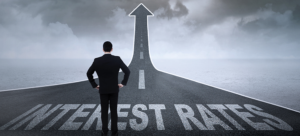
Higher interest rates could be here sooner than we anticipated – plan ahead.
Higher mortgage rates could be coming – and a lot sooner than many of us anticipated. Ever since the start of the year, the Canadian economy has been on a tear. GDP soared 3.7 percent in the first quarter, followed by 0.2 percent in April.
With our economy not showing any signs of slowing down, all signs points to an interest rate increase on July 12th when the Bank of Canada makes its latest announcement. (There’s even speculation our central bank could hike interest rates a second time this year if key economic indicators remain strong.)
For years the Bank of Canada has been warning of higher interest rates. Although an interest rate hike is good news and a sign that our economy is getting strong, it’s not such good news for Canadians with a lot of personal debt. Our central bank is especially concerned about the record level of household debt we’re carrying. The stats speak for themselves: for every dollar of income, we owe an average of $1.67.
That’s fine and dandy as long as interest rates remain low (and you hold onto your job), but what if rates start to rise? That’s when many Canadians could find themselves in for a rude awakening. A recent survey from Manulife Bank found that almost three quarters of Canadian homeowners would have difficulty paying their mortgage every month if their payments increased by as little as 10 per cent. Yikes!
How Does a Hike in Interest Rates Affect Homeowners?
If the Bank of Canada decides to raise interest rates on July 12th, it’ll be felt immediately by some and later on by others. If you’re a homeowner with a variable rate mortgage, it will mean higher mortgage rates right away. With a variable rate mortgage, your mortgage rate is based on a spread plus/minus prime rate. Today prime rate sits at 2.70 percent at most lenders. If you have a variable rate mortgage of prime minus 0.7 percent, then your mortgage rate would be 2.00 percent.
When our central bank raises interest rates, it’s almost a certain the big banks will follow suit and raise prime rate, but the question is by how much? If the Bank of Canada raises interest rates 25 basis points, will the banks raise prime rate the full 25 basis points or only 10 or 15 basis points? (Don’t forget that the banks only reduced prime rate by 10 or 15 basis points during the last two interest rates cuts in 2015.) If I was a betting man, I’d put my money on the banks hiking prime rate by the full 25 basis points.
So, let’s say the Bank of Canada increases prime rate by 25 basis points and the banks follow suit and raise prime rate by 25 basis points. Based on the above example, your mortgage rate would now by 2.25 percent.
Let’s run through an example to show the difference in mortgage payments. Let’s say you bought a one bedroom condo in downtown Toronto for $500,000 with a 20 percent down payment, leaving you with a mortgage of $400,000, amortized over 25 years. If your mortgage rate was 2.00 percent, your mortgage payment would be $1,694 per month, but if mortgage rates went up to 2.25 percent, your new mortgage payment would $1,742 per month. That’s $48 per month extra you’d have to shell out. And this is just from one rate increase. If our central bank increases rates again later in the year by another 25 basis points, your new mortgage rate would be 2.50 percent and your new mortgage payment would be $1,792 per month. That’s $98 per month higher from when rates were 2.00 percent.
If you have a fixed rate mortgage, you can breathe a sigh of relief. You won’t feel the impact of higher rates right away. But that doesn’t mean you’re in the clear. If mortgage rates are higher when your mortgage comes up for renewal, that’s when you’ll feel the pinch.
How to Lessen the Impact of Higher Mortgage Rates
The simplest way is by burning your mortgage. Instead of using low interest rates as an excuse to get further in debt, use them as an opportunity to pay off the biggest debt of your lifetime, your mortgage. Although there’s no guarantee Stephen Poloz will hike interest rates July 12th (he’s a bit of a loose cannon), interest rates aren’t likely to stay this low forever. It’s smart to plan ahead.
By following the advice in my book – paying your mortgage as if rates are already higher, making lump sum payments with found money, and paying your mortgage on an accelerated payment schedule – you can use low interest rates to your advantage and be in good financial shape to handle a rate hike or two whenever it happens.
Sean Cooper is the bestselling author of the book, Burn Your Mortgage: The Simple, Powerful Path to Financial Freedom for Canadians, available now on Amazon and at Chapters, Indigo and major bookstores, and as an Audiobook on Amazon, Audible and iTunes.